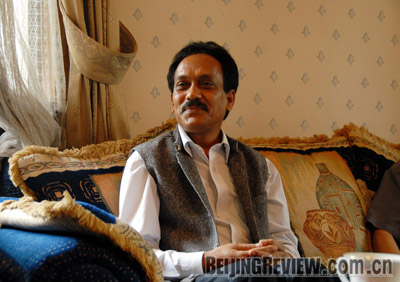|
|

|
|
"The foremost expectation of the Nepalese [is for the new government] to establish permanent peace and stability in the country."---Tanka Prasad Karki, Nepal's Ambassador to China |
Beijing Review: Nepal has abolished the monarchy to become a federal republic. What impact will this shift have on Nepalese society?
Tanka Prasad Karki: The Nepalese people tried to accommodate the constitutional monarchy within the parliamentary democratic system after the mass movement of 1990. But in 2005, dethroned King Gyanendra reinstated an absolute monarchy by sacking the elected government. Unacceptable as it was for the people, the political parties staged nationwide protests. As you may have noticed, an overwhelming majority of the Constituent Assembly voted in favor of a republican system on May 28.
The Shah kings reigned over Nepal for 240 years, out of which a period of 104 years was ruled by the Ranas, forcing the Shahs to remain de jure figureheads. In 1950, King Tribhuvan joined hands with the people in a movement to oust the Rana oligarchy. He made a promise, albeit never fulfilled, of a democratic Nepal through the formation of a Constituent Assembly.
While the country was struggling to stabilize democratic institutions, the 1960 decision of King Mahendra to sack the first ever elected government, arrest party leaders and start a partyless Panchayat system pushed the country further backward. King Birendra, who was killed in the royal massacre of 2002, ended the Panchayat system in 1990, reopening the democratic process that had been suspended for 30 years. Unfortunately, ex-king Gyanendra's move backfired, resulting in a farewell to the institution of monarchy in Nepal. In my conclusion, political systems carrying on feudalistic values and undemocratic practices will have to face the same fate.
This transition will qualitatively contribute to the capitalist development of Nepalese society, so that production relations and productive forces will be led to a higher stage.
What are Nepalese people's expectations for the new government? What will be its priorities?
The foremost expectation of the Nepalese is to establish permanent peace and stability in the country. For this we need to draft the constitution in time so as to institutionalize democracy. Equally important is the task of giving impetus to our socioeconomic transformation. In this course, the future government will safeguard national independence, sovereignty and territorial integrity. These are the public's expectations as well as the priorities of the new government.
What are the challenges facing Nepal's new president, Ram Baran Yadav?
The executive power of the state will be exercised by an elected government to be headed by the prime minister, while the president will act as the constitutional head of state. These are the principles that have been defined and agreed upon so far.
Different parties contended fiercely to form a new government. Is there a risk that their contention may fuel political fragmentation?
| 